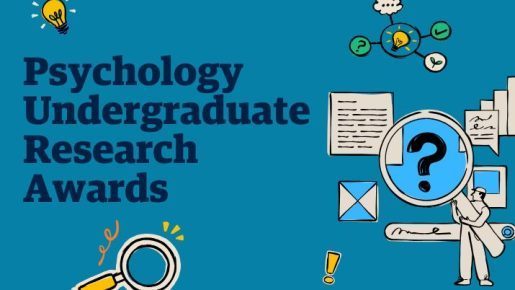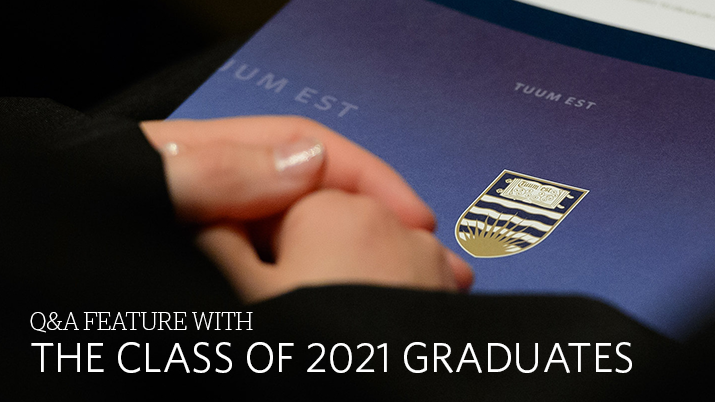

Join us in congratulating the graduating Class of 2021!
During their time as undergraduate students at UBC, our graduating students have been involved in research, led their own directed studies, taken on positions through UBC’s Work Learn and the Arts Internship Programs—and have demonstrated leadership by their involvement in conferences, seminars, and our student associations. We thank each and every one of them for their contributions!
In a Q&A, a few of our graduates share with us some of their achievements, future plans, and lessons learned.
Kaja Bakken
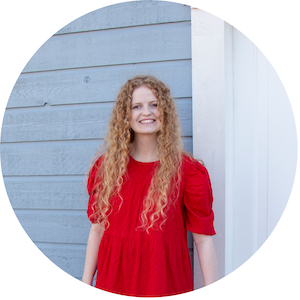

First of all, can you tell us a bit about yourself, your interests, research, and awards?
Hi! I’m Kaja, and I have loved my time with UBC Psychology and the wider UBC community. I have volunteered at Imagine Day, been in leadership positions in a variety of clubs, was involved with the Arts Internship Program and am currently a directed studies student and Research Communications Coordinator with the psychology department.
I took a gap year after my first year at UBC, I lived in Norway and had the amazing opportunity to spend time living with families in a variety of different cultures and places. Through this experience, I developed a passion for empowering vulnerable families through the dissemination of research findings and supporting local resources and voices. When I came back to UBC, I explored this more through my time with the Arts Internship Program and within the psychology department, where I developed the skills to cultivate community as well as program and research support through media and communications positions. During my undergrad, I have had the honour of ranking academically in the top 5% of my year and faculty. This summer, I will be working on a directed studies project looking that the relationship between perfectionism variables and self-disclosure in group psychotherapy.
Outside of the department, I am passionate about photography, data humanism, and visualization, exploring the world, and finding the best cup of coffee in Vancouver.
What program were you in and why did you choose to study psychology at UBC?
I was in the BA program, majoring in psychology and minoring in visual arts. Coming out of high school, I knew I wanted to work in the mental health field and studying psychology seemed to be the perfect fit. While psychology and visual arts seem to be two very different fields of knowledge, taking the two in tandem has expanded my way of thinking, analyzing, and interacting with the world. I’m so glad I started psychology at UBC and I’ve never looked back!
Is there a single most important moment that has stood out for you during your time as a psychology student?
Looking back, there have been so many great moments – it’s hard to choose just one! However, one of the most impactful moments that I will always remember was the day when I realized that research is something that I might want to pursue as a part of my career. Prior to this point, I knew I wanted to work with children in the mental health field, but I did not know exactly how. Nothing special was going on that day, just the right combination of classes, all of which were discussing applied research, and I had this moment where everything just clicked.
From there, it all started to come together, and I could see how all my various passions and skills I’ve developed over my time at UBC could align into a coherent career goal. Throughout my undergrad, I’ve heard many inspirational speakers and been a part of many meaningful events, however, this one day was one of the most formative moments for me and my career path. Since then, I have been so thankful for the wonderful professors and staff who have supported me in exploring what my future journey could look like.
What advice do you have for students on how to carve their own academic path?
I would say to explore all your options and get involved in as much as you can! UBC and the psychology department have so many exciting and diverse opportunities for students to engage with, so take the time to investigate what’s available to you. One thing I really wish I had done more as a first-year was to take the time to reflect on what I hoped to get out of my university experience and then how I could practically implement these dreams into practice. My undergrad passed way faster than I imagined it would, and there are definitely some experiences, small and large, that I would have loved to take part in. However, I’m so thankful for the diverse number of opportunities I was able to partake in (and continue to engage in) at UBC. I think it’s important to remember that there’s no “right way” to university or one path that everyone must go down. Every person’s journey will be unique to them. Avoiding comparing your journey to those around you allows you to really make your time at UBC the best journey it can be for you.
What are your future career plans?
Wow, what a question! Eventually, I am hoping to pursue a career as a clinical psychologist and work with children in both therapeutic and research settings. Additionally, I would love to start or work for a non-profit organization that amplifies and supports local voices (within that context) in providing culturally relevant mental health resources and education to vulnerable children, youth, and their guardians.
Throughout my undergrad, I have been working in various communications positions. I feel so fortunate to have developed skills that can be applied in any work context in the future while getting to do work that I love. For the summer, I am excited to be working with the psychology department as Research Communications Coordinator and am looking forward to what happens next.
Graduating during these unprecedented times, what are some lessons you learned from the pandemic that you will carry with you?
I think it’s fair to say that none of us ever imagined that this is what our last year would look like. As I reflect over the past year, two lessons really stand out. Firstly, academic success – however you want to define that – without community and people in your life often isn’t sustainable. While time spent with friends, family, peers, and colleges has looked vastly different over this past year, having people in your life that support you and root for you is so important, and so is making time for those relationships. For me, taking that time to be with my friends and family has allowed me to be refreshed to continue pursuing excellence in what I do. These breaks are essential for me – they result in better productivity and focus while preventing my academic and work-life from becoming my entire world. Secondly, if there’s something you want to do or try, just go for it! This year has been a reminder that my expectations of what an experience will be like is not guaranteed. Personally, through completing my degree online, I’ve learned to both take advantage of the opportunities available to me at that moment and be creative in making great memories when life is not what I expected it to be. While there are events and experiences I had put off for my last year that could not happen due to COVID, I’ve also made so many great memories and really appreciated all the creativity and effort of everyone who organized online events to make this year as memorable as possible. I hope to carry these two lessons (and many more!) with me into the next phase of my life.
Maria Shock


First of all, can you tell us a bit about yourself, your interests, research, and awards?
After spending my gap year working at a compounding pharmacy, I was keen to get involved in research when I came to UBC. I have been a research assistant in the Soma Lab for the past three years. Since then, I have held two Work Learn positions and completed two years of Directed Studies. During my time in the Soma Lab, I have been assisting Cecilia Jalabert with her PhD research, investigating local sex steroid synthesis in the brain. Under the supervision of Dr. Kiran Soma, I have been validating an ultra-sensitive method for measuring estrogens in the blood and brain, using chemical derivatization and liquid chromatography tandem mass spectrometry. My future interests lie in investigating the roles of estrogens in breast cancer pathology, and the effects of estrogen therapies on post-menopausal women. I was honoured to receive both the J Fred Memorial Scholarship in Science during my undergraduate degree, as well as an NSERC USRA this summer to support my research.
I have been a volunteer for the Sharing Teens and Elders Project for multiple years, where our aim is to ameliorate the negative impact of social isolation by bridging the intergenerational gap between youth and elders through companionship and community. Prior to the pandemic, I also enjoyed visiting classrooms in East Vancouver to facilitate and guide sixth graders through science experiments with Let’s Talk Science UBC. As well, I was given the opportunity to work as a daycare assistant with toddlers at Huckleberry Daycare on campus which has further inspired me to work with children during my career. Some other interests of mine include backpacking through Asia and Europe, training for a half marathon, and consistently being on the lookout for new burrito spots in Vancouver.
What program were you in and why did you choose to study psychology at UBC?
I have recently graduated from the Behavioural Neuroscience program. When I first came to UBC, I was a second-year transfer student and I remember feeling quite overwhelmed ranking the possible specializations I could enter. I originally began my university career at McGill where my class sizes were at times 700+ students. I decided to put Behavioural Neuroscience as my top choice because I was drawn to learning more about the brain, as well as having smaller class sizes where I could more easily get to know my peers and form stronger relationships with my instructors.
Nonetheless, I had never taken a psychology course before being admitted to the Behavioural Neuroscience program and took a risk when I chose to apply! However, during my first term I had the opportunity to take classes (PSYC 102 with Dr. Odic, and PSYC 270 with Dr. Soma) that made me realize that I was exactly where I was meant to be. Specifically, I found myself fascinated with the theories behind different psychiatric disorders in PSYC 102, and the effects of hormones on neural development in PSYC 270.
I continued to find throughout my degree that professors in the psychology department at UBC genuinely cared about their students and their learning. I hold immense gratitude towards the UBC Psychology community for connecting me with the mentors who have provided me with guidance and advice during my time at UBC.
Is there a single most important moment that has stood out for you during your time as a psychology student?
This year as Vice-President Internal for the UBC Chapter of Psi Chi, I led my team in the organization and facilitation of an initiative that I am very proud of, Get Psyched: the Mentorship Program. During the current pandemic and the suspension of all in-person UBC campus tours, our vision was to provide extra guidance to senior high school students interested in the UBC Department of Psychology. Our program had two components: a live Zoom panel with an informative presentation, and mentee-mentor pairings spanning six months. We enrolled 180+ mentees from Vancouver, Canada to Bangkok, Thailand. We strived to make our mentorship program inclusive and mentee-oriented by providing mentors from Behavioural Neuroscience, Psychology, and Cognitive Systems. When creating our mentorship contract we stressed the importance of our mentees’ values coming first. Our program provided mentees with a safe, non-judgemental space, to ask questions regarding UBC and the transition out of high school, all while presenting the UBC Psychology program in a positive and compelling light.
My hope is that next year UBC Psi Chi will continue this initiative, even as in-person campus tours resume in the future. Get Psyched allows international students who may still not have the opportunity to visit campus access resources about UBC Psychology and have the opportunity to receive one-on-one advice from current students.
What advice do you have for students on how to carve their own academic path?
I think it’s important to remember that you define success for yourself; what success might look like in your life might be very different compared to the concept of success held by others. We are all on different journeys with different timelines, so try not to compare yourself to your peers.
In terms of choosing an academic path, I’ve come to learn that you should choose coursework that excites you, even if it challenges you more than expected. Courses that are sometimes described as being an “easy A”, may not necessarily provide the opportunity for you to grow as a student and thrive. I am so happy that I chose Behavioural Neuroscience because the content in my courses fascinated me, and they motivated me to wake up for those early morning lectures. For my electives, I chose to explore outside of my comfort zone, choosing courses like philosophy, creative writing, and microbiology, and I am so grateful that I did so because it allowed me to explore my interests in other areas and challenge myself.
Finally, I would say to find a mentor(s) who can help guide you and support you during your time at UBC. Building strong relationships with professors, graduate students in your lab, or senior undergraduates has played a pivotal role in my degree and my future career path. Most importantly, have trust in yourself, your abilities, and make the most out of your time at UBC!
What are your future career plans?
I am honoured to have recently accepted an offer to McMaster University Medical School – a true dream come true for me! I am beyond excited to continue learning about material that fascinates me and applying that knowledge during my career to help others. I am also hoping to continue to be involved in research during medical school. I have been working with estrogens during my undergraduate research and have had the privilege of presenting my work at the Women’s Brain Health: Young Investigator’s Symposium. I want to continue to be an advocate for women’s health research, and my hope is to get involved in future research related to obstetrics and gynecology or breast cancer research. I am very thankful for the experiences I have had and the people I have had the pleasure of meeting during my undergraduate degree at UBC. Specifically, I want to thank Dr. Kiran Soma and Cecilia Jalabert for supporting me throughout this journey.
Graduating during these unprecedented times, what are some lessons you learned from the pandemic that you will carry with you?
I think this pandemic has really taught me the importance of mental health. Throughout this year many of us have faced social isolation, fear, loss and/or anxiety towards our futures and the health of both ourselves and our loved ones. As a student, adjusting to online classes has also been a new challenge, especially adapting to the absence of in-person support from my classmates and instructors. However, I have learned a few tips that have helped me throughout this past year that I thought I would share.
First, I have learned that motion is medicine. Taking even a small amount of time out of your day to move, whether that is a short workout, practicing yoga, or simply taking a walk through your neighbourhood can truly boost your mental state. Second, meditation can be helpful in coping with stress and dealing with Zoom fatigue. I started practicing meditation for the first time at the start of the pandemic because I was desperate to ease my worries about the future, but now I continue to practice as it creates space for me to focus and ground myself. Third, schedule in time with your friends. I think this pandemic has taught me the importance of putting aside allocated time to call friends and catch up. As humans, we all have the essential need to socialize – listen to that and find uninterrupted time to fill that need. Fourth, always remember to check in on your loved ones. This pandemic has been tough on all of us, and we are all still mourning losses in one form or another. Even those who may not appear to be struggling may need a friend. One of my friends this year had a check-in she scheduled for the start and end of each term where she would message me and other people in her life to ask how they were holding up. These messages meant so much to me throughout the year, as she created a space for me to let her know if I needed support.
Rachel Lee
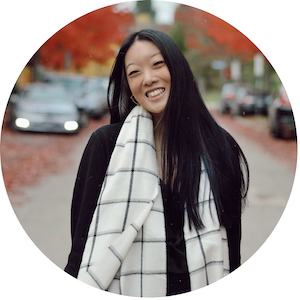

First of all, can you tell us a bit about yourself, your interests, research, and awards?
Hi, I’m Rachel and I have been deeply ingrained in the department as a Psych Imagine Day volunteer, Teaching Assistant, Directed Studies student, Research Assistant, Lab Manager, and Communications and Web Coordinator. However, I also just enjoyed my time as a psychology student navigating the post-secondary world!
Throughout my five-year journey, I have had a number of interests and explored them through holding positions in clubs, organizing student conferences, volunteering in labs, and (almost!) going on exchange. It was through my extracurricular activities that I found my passion for marketing and communications.
Though I won’t be following through with the research I conducted in my third year, I view my experience in research and lab work as incredibly invaluable. My directed studies project was executed in the social and health psychology areas, where I examined social interaction as a potential buffer against the health consequences of loneliness. Simply from planning, coordinating, and implementing such a project, I gained many skills that have helped me understand and evaluate data in my current career path.
During my time at UBC, I have had the pleasure of ranking academically in the top 10% of my year and faculty, receiving a Go Global award and being nominated for a President’s Student Leadership Award.
What program were you in and why did you choose to study psychology at UBC?
I am graduating with a Bachelor of Arts, Psychology and a minor in Health and Society (HESO). It was actually my high school psychology teacher that inspired and encouraged me to pursue my psychology degree. He was the one who saw that I had a knack for the subject and a potential to enjoy trying to explore this subject further. He was right, of course, and looking back, choosing to study psychology at UBC has been one of my best decisions!
Is there a single most important moment that has stood out for you during your time as a psychology student?
A moment that I will always remember from my time as a psychology student is when I partnered with UBC Arts for a “Day in the Life as a Research Assistant” Instagram takeover. This was the perfect culmination of all the skills and experiences I have been building up over the past few years as a Communications and Web Coordinator, Lab Manager and Senior Research Assistant. I combined my interest in communications and social media with my practice and understanding of research.
I wouldn’t be where I am today without my five (yes, five!) Work Learn terms as a Communications and Web Coordinator with UBC Psychology. This is where my passion for marketing and communications bloomed and my supervisor (and now colleague!) Bonnie Vockeroth has been an incredible inspiration throughout it all. I owe a lot to UBC Psychology, not just for an award-winning education, but also, in preparing me for my career. I truly have all my professors, PIs, and supervisors to thank for helping me accomplish everything these past five years.
What advice do you have for students on how to carve their own academic path?
I would advise students to try anything and everything (or as much as possible, your mental and physical wellbeing should always be a priority!). To figure out which area of psychology interested me the most, I volunteered in many labs across the department. I started out in a neuroscience lab, spent some time in a clinical psychology lab, transferred into a social psychology lab and found my place in a social health psychology lab. It was only with a hands-on experience within the given area, that I was able to evaluate my interests and navigate to a career path I knew was a right fit for me.
Moreover, my undergrad years passed way quicker than I thought. I am happy with the number of opportunities I was able to take advantage of (RezLife, SLC, MURC, the WorkLearn program, among many others), but I also missed out on a few other experiences I would have loved to try as well (specifically, leading a self-directed seminar!). Take the time to browse through what UBC Psychology and the greater campus has to offer!
I also wrote this article about How to Make the Most of your UBC Psychology Undergraduate Experience (shameless self-promo), that could be of interest to check out!
What are your future career plans?
I went into first year as a future clinical psychologist, but instead came out as a Marketing and Events Specialist! I am currently holding a position with the UBC Centre for Teaching, Learning and Technology in their events unit and I am absolutely loving it. My career goals switched directions in my fourth year and I am aiming to stay within the digital marketing and communications field for the foreseeable future. My five years of studying and working at UBC has only deepened my connection to the community and I will continue living and breathing UBC…at least for now!
Graduating during these unprecedented times, what are some lessons you learned from the pandemic that you will carry with you?
Working (and studying) from home has been quite the adjustment. The most valuable lesson I have learned from this experience is optimizing my productivity levels throughout the day. I have found that working through more analytical material in the morning and switching to creative projects in the afternoon not only helps balance out my workload, but also, aligns with my changing productivity levels.
Sotera Mader
Sotera Mader is a graduate of UBC’s Speech Sciences program. While the program is offered by UBC Linguistics, it is interdisciplinary in nature and involves courses from Psychology. Sotera has made notable contributions to the psychology department through her work in Dr. Janet Werker’s Infant Studies Centre.
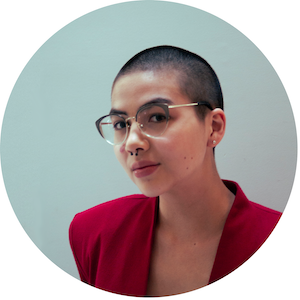

First of all, can you tell us a bit about yourself, your interests, research, and awards?
I am currently a research assistant at Dr. Janet F. Werker’s lab, which focuses on infant language development. I’ve been working under Dr. AJ Orena on his project on voice recognition in children with cochlear implants. I first came to the lab in January 2020 through the Indigenous Undergraduate Research Mentorship Program and was awarded an NSERC USRA that summer. I stayed on as a volunteer for the following school year, and have been awarded a second NSERC USRA for this summer.
What program were you in and why did you choose to study psychology at UBC?
I actually graduated in speech sciences, which just happens to have a lot of overlap with psychology. I originally came to UBC with the intention of majoring in Asian studies, but fell in love with linguistics. I then discovered that speech sciences is comparatively more applicable to a wider range of career options.
Is there a single most important moment that has stood out for you during your time as a psychology student?
I am not sure about a single moment, but I am regularly inspired by everyone at the Werker lab. Everyone has such a unique story, and it’s a great reminder that there is no one ‘right’ way to go through life.
What advice do you have for students on how to carve their own academic path?
My advice would be to not be afraid of changing your direction. Change your major if you’re unhappy with your current one. Take courses that interest you and leave you feeling fulfilled and inspired, rather than just doing what you think you’re supposed to.
What are your future career plans?
I was thinking of pursuing speech-language pathology, but I’m not so sure anymore. I have also been considering going into counseling. I really want to bridge the gap between neurodivergent folks like myself, and the neurotypical world; I just haven’t decided the best way to do so yet.
Graduating during these unprecedented times, what are some lessons you learned from the pandemic that you will carry with you?
If anything, the pandemic has taught me a lot about my own limitations. Moving forward, I will use this experience to remind myself that it’s okay to ask for help when I need it.


